Over 1,800 hectares of natural forest in the timber concession of Babugus Wahana Lestari in Central Kalimantan is facing immediate threat of destruction, Earthsight and Auriga Nusantara can reveal.
Between January and May 2024, a grid of dirt roads appeared across an 1,811-hectare (18 sq km) area of natural forest in PT Babugus Wahana Lestari, a timber plantation concession in Central Kalimantan, Indonesian Borneo. The grid, comprising 1km x 250m rectangles of tracks cut into the forest, bears the hallmarks of preparation work to clear the area for timber plantations – indicating that the forest faces imminent threat of clearance.
Earthsight/Auriga initially identified this activity through remote monitoring of satellite imagery. Researchers then visited the concession in August, capturing drone footage of the affected area.
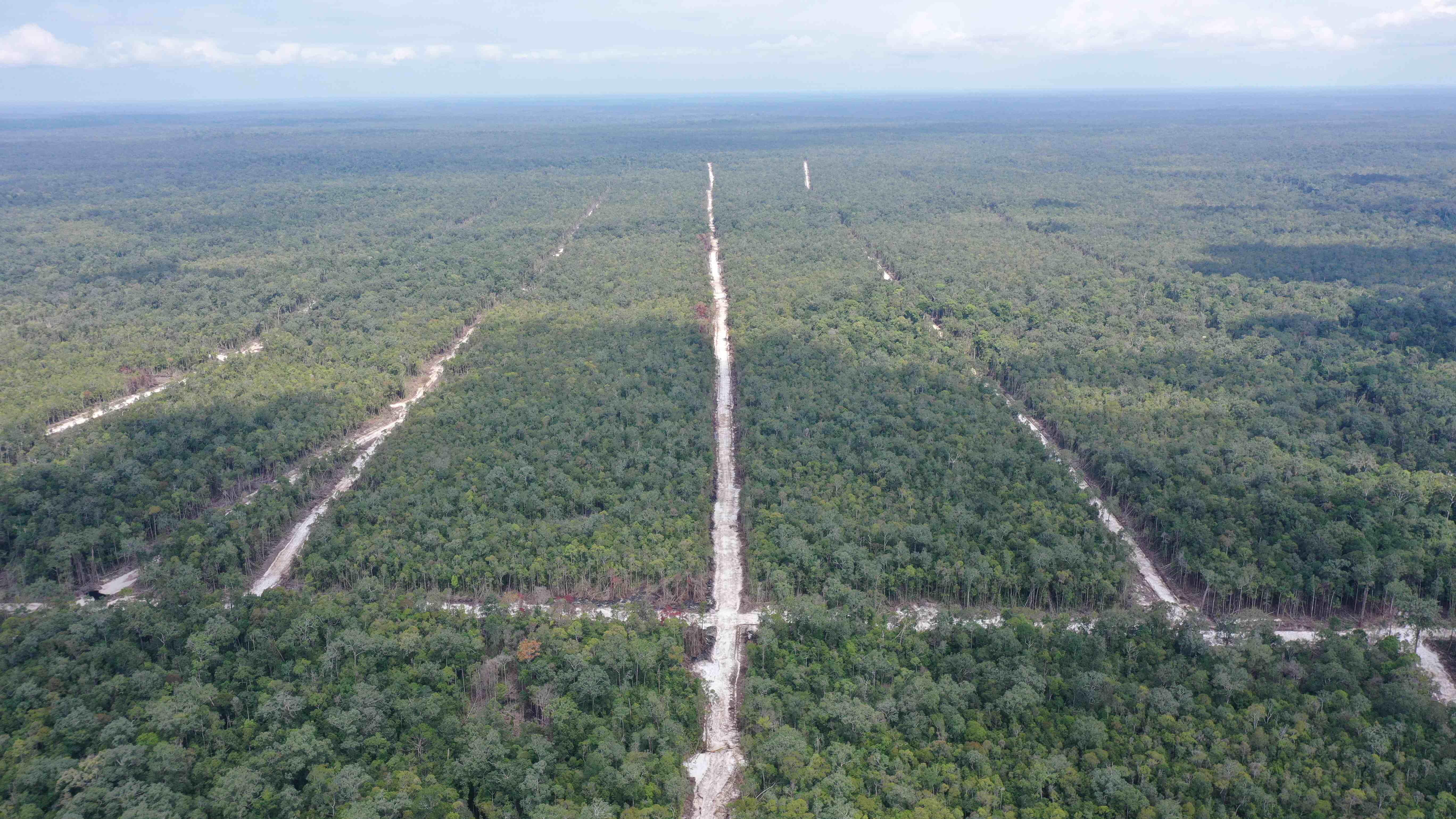
A contractor who has worked on the project said that the company intends to develop a monoculture timber plantation in this part of the concession, near the village of Pujon, with the wood grown being used for biomass (turned into wood chips to be burned to produce electricity). In recent years, timber plantations for bioenergy have emerged as a significant driver of natural forest loss Indonesia.
The entire concession area was mapped as orangutan habitat in the Government of Indonesia’s 2019 Orangutan Conservation Strategy and Action Plan, and represents 5 per cent of the total range of the Kahayan-Kapuas metapopulation, which comprises 1,680 orangutans. The head of Pujon village told Earthsight/Auriga that an orangutan nest had been found when a ritual was held to mark the start of road development in the area.
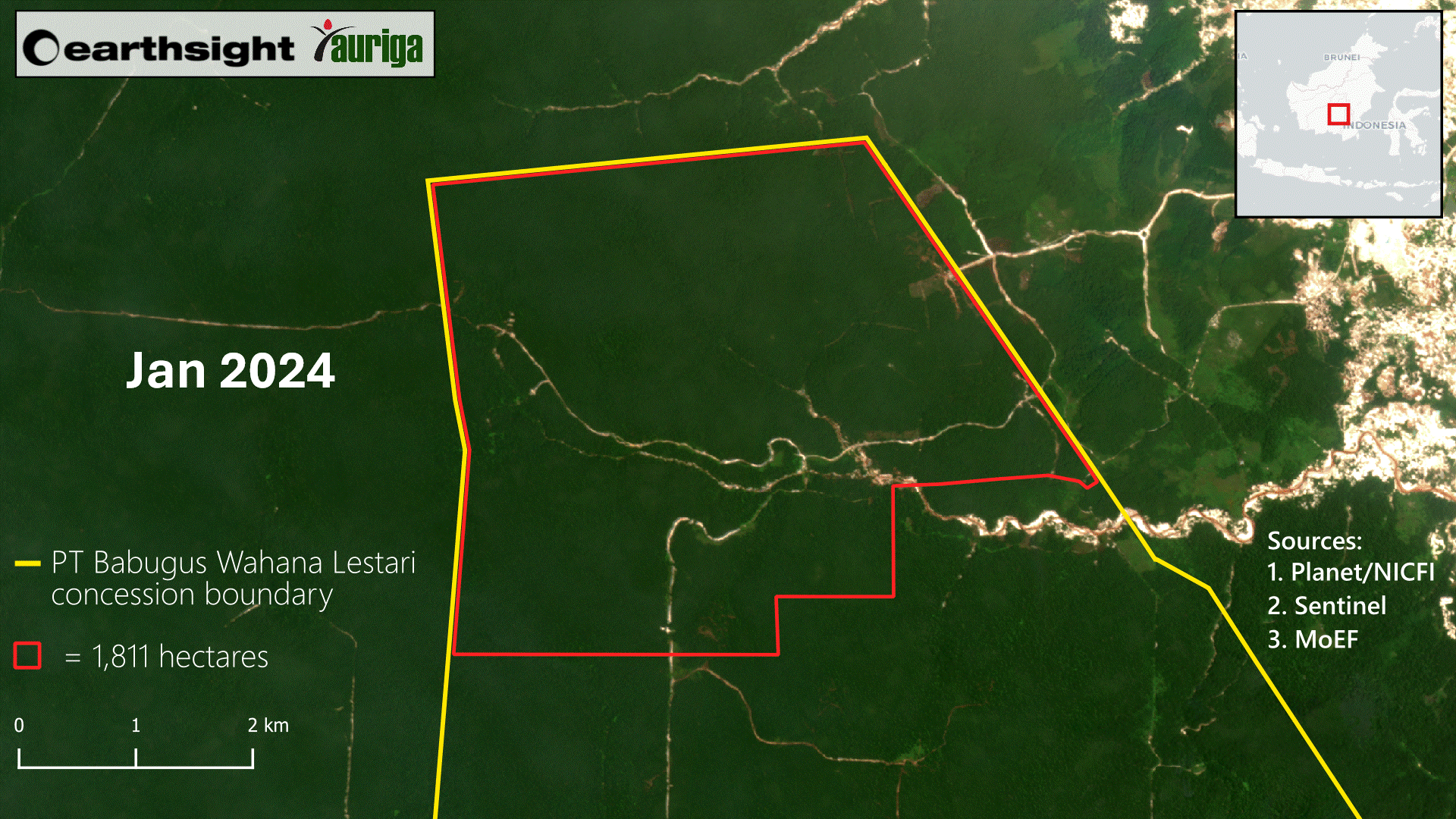
Analysis of satellite imagery also revealed that extensive logging was carried out in approximately 1,000ha of forest near the village of Kota Baru in 2023. Tracks now crisscross an area of previously intact forest where tree cover has been thinned significantly, likely having a major impact on the forest’s ecology. Unlike in the northernmost part of the concession, logging in this area has not formed a grid-like pattern that would indicate plans to clear the forest entirely.
A local resident told Earthsight/Auriga that logging activity in this area was selective cutting of meranti (Shorea sp.), keruing (Dipterocarpus sp.) and benuas (Shorea laevis) – hardwood tree species which are traded internationally for uses including plywood, decking and furniture.
Some of this logging appears to have been illegal, having happened outside the logging blocks permitted in the company’s work plan, which has to be submitted to and approved by the government.
All companies which produce, process, trade or export wood products in Indonesia are required to hold a certification of legality, the SVLK. Independent auditing bodies assess their activities against various legal requirements, and can either grant or deny a company SVLK certification. According to an assessment report for Babugus Wahana Lestari, available online, between August 2022 and March 2023 the company cut down trees in areas designated for work in 2024 and 2025. The report also indicates the company had failed to provide an environmental impact assessment plan for the second half of 2022 and first half of 2023. As a result of this, Babugus Wahana Lestari had its timber legality certificate suspended.
Auriga and Earthsight wrote to both Babugus Wahana Lestari and the auditor responsible for the certificate’s suspension in advance of this article’s publication to determine whether the company’s timber legality certificate has been restored or remains suspended. No response had been received by the time of publication.
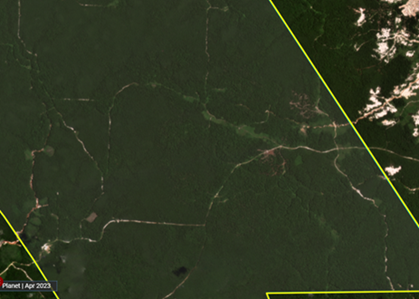
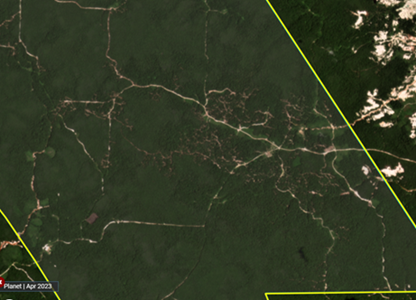
An area in the PT Babugus Wahana Lestari concession, Central Kalimantan, where extensive logging has taken place between April 2023 (top) and February 2024 (bottom). Source: Sentinel-2, via Sentinel Hub EO Browser
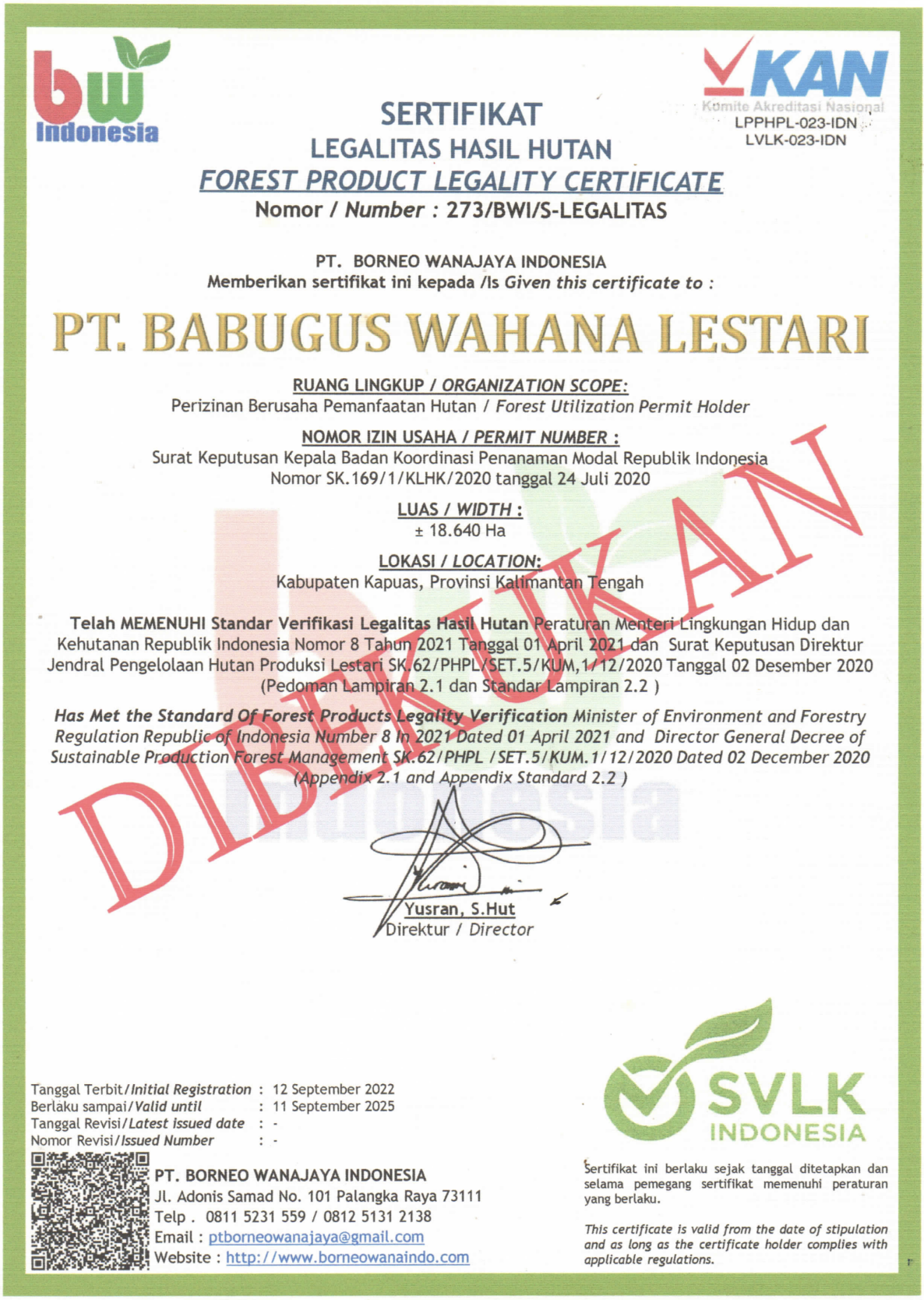
A page from an October 2023 legality assessment report on PT Babugus Wahana Lestari; the red writing states the certification is ‘suspended’
Using government-held records of timber sourcing along with international shipment records, Earthsight/Auriga identified two timber processing companies in Indonesia that purchased natural forest wood from Babugus Wahana Lestari in 2023 – likely from the logging identified above – while also exporting significant quantities of hardwood to companies in the EU, UK and US.
Auriga analysis has found that since 2020, the timber plantation industry has become the single biggest driver of natural forest loss in Indonesia, with 42.251 hectares of deforestation detected in timber plantation concessions in 2023, compared to 24,634 hectares in oil palm concessions. Babugus Wahana Lestari is located in an area of Central Kalimantan province which has seen its forests devastated by clearance for timber plantations in recent years, including in the adjacent PT Industrial Forest Plantation concession, where almost 12,000 hectares of forest were cleared between 2021 and 2023.
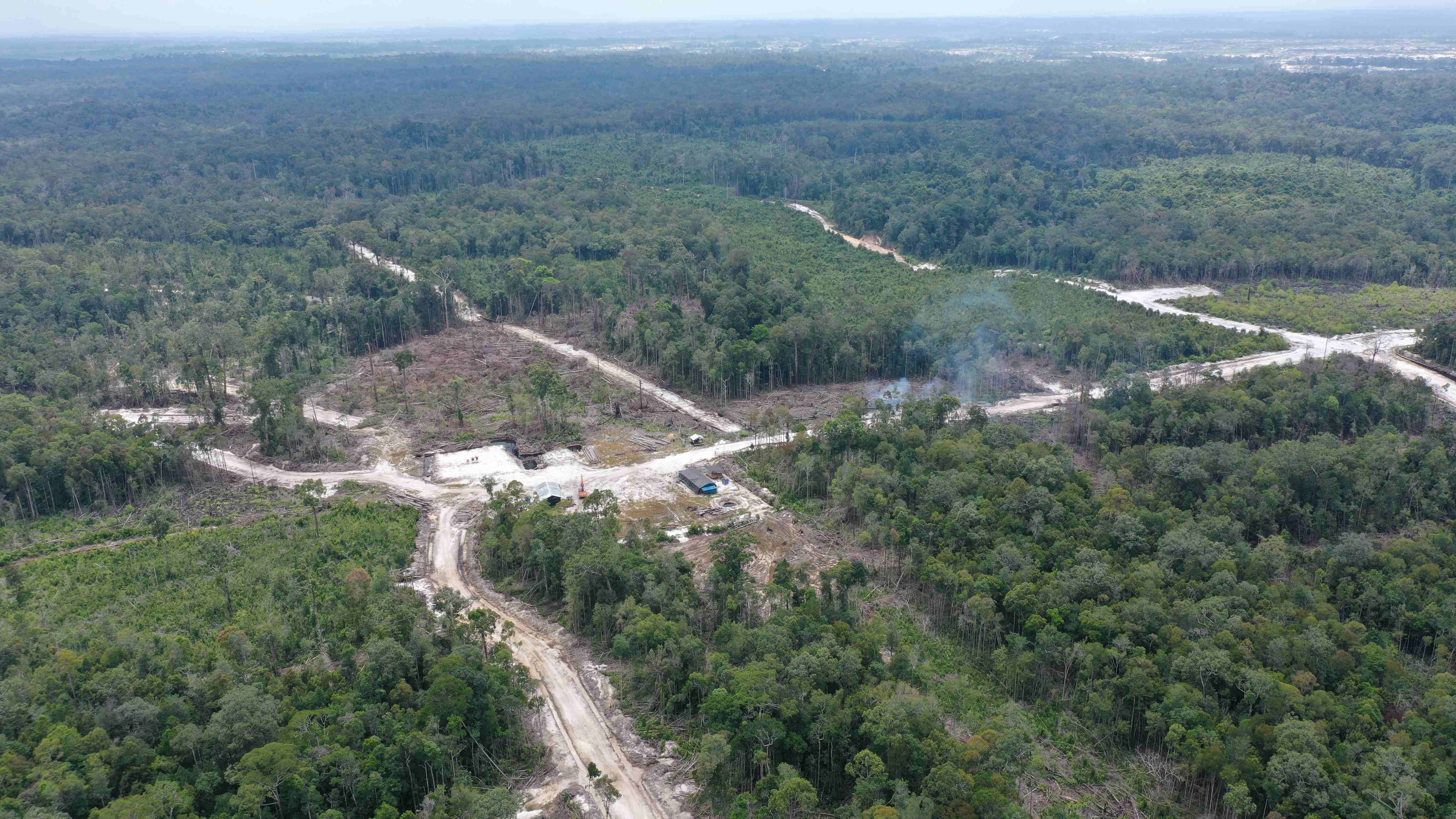
A company security post within the Babugus Wahana Lestari concession, August 2024. Image: Auriga/Earthsight
Babugus Wahana Lestari has come into conflict with local communities over its forestry activities. A local resident told Auriga that residents of Hurung Pukung village, adjacent to the concession, have protested against logging activities carried out by the company on land they claim is owned by the community. In February 2024, a resident of Hurung Pukung village was arrested after setting fire to five buildings and 1,000 tree seedlings in protest over alleged broken promises to share profits from logging with the community.
The head of Pujon village told Earthsight/Auriga that he hopes the forest in the concession will be maintained for the benefit of the climate and livelihoods of the local community.
New roads cut into forest in the Babugus Wahana Lestari concession, August 2024. Image: Auriga/Earthsight
According to local residents, logging activities have been temporarily paused in Babugus Wahana Lestari. However, the road building activities detected to date clearly indicate that the company intends to clear large areas of natural forest in the near future.
Preservation of surviving natural forest is critical for Indonesia to achieve its climate targets and protect its increasingly threatened biodiversity, such as the critically endangered Bornean orangutan. As such, the government should immediately issue a ‘stop work order’ to Babugus Wahana Lestari to stop the clearing – as happened earlier this year to halt large-scale forest clearance in the concession of Mayawana Persada in West Kalimantan – and direct the company to restore areas that have already been logged.
If the threatened forest is destroyed, imports of the resulting timber into the EU will be illegal from 30 December 2024, when the EU Deforestation Regulation (EUDR) – which prohibits imports of wood, palm oil, soy, coffee, rubber, cocoa, beef and leather resulting from deforestation or forest degradation since 30 December 2020 – comes fully into effect. Importers will need to conduct careful due diligence before sourcing meranti or other hardwoods from Indonesia, to ensure the wood does not come from clearance of natural forest.
This case highlights the critical importance of the EUDR to stop companies in Europe profiting from the destruction of precious and irreplaceable tropical forests, and underlines the need for its full implementation without delay.
This article is the result of a new collaboration between Earthsight and Auriga Nusantara to investigate and expose European and US complicity in deforestation and forest degradation in Indonesia, and associated harm to biodiversity and local communities.